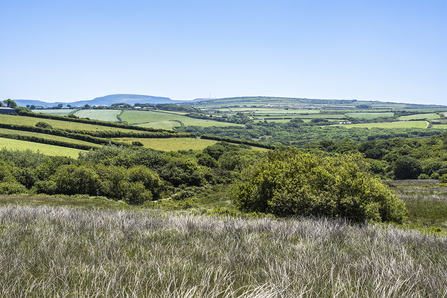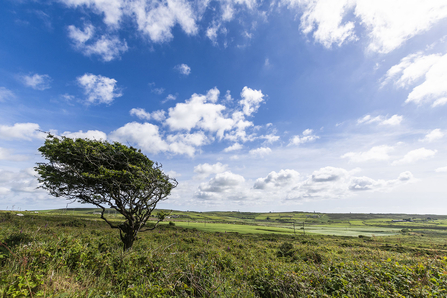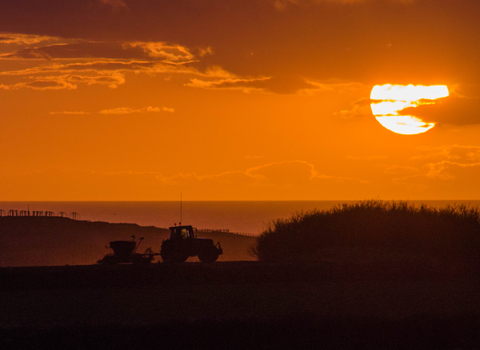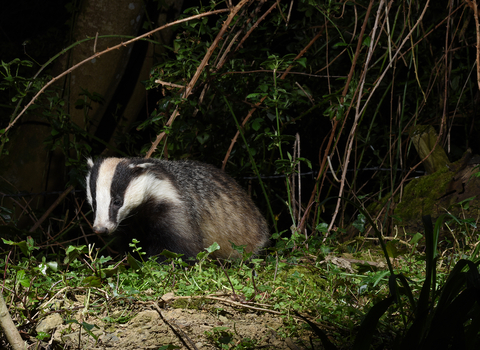Farming in Cornwall
Farming is a vitally important industry in Cornwall and has helped shape the landscape as we see it today. Over 70% of Cornwall’s land is farmed in some way, with much of the county’s countryside dominated by grass pastures for beef and dairy cattle and areas with the most fertile soils in the east and far west yielding heavy crops of vegetables and cereals. Almost every type of farming practiced across the UK can be found right here in Cornwall, and we’re working with hundreds of fantastic farmers from all backgrounds to encourage sustainable methods that will enable nature to thrive once again.
More than 70% of Cornwall is used to produce our food. We must work collaboratively with farmers if we are to bring nature back. We have a shared passion for Cornwall and its wildlife and good things happen when we learn from each other.Head of Conservation at Cornwall Wildlife Trust
Why are we working with farmers and landowners?
The key findings from our State of Nature Cornwall 2020 report found that much of our local wildlife is in decline including our farmland species, with a 30% decline in farmland birds since 1994 and a decrease in butterflies associated with our farmland habitats. We believe that in order to achieve a Wilder Cornwall, farmers and conservationists must work together and support one another to benefit long-term food production and biodiversity.
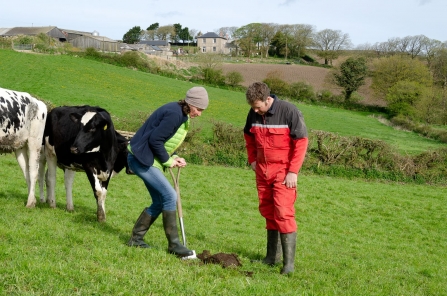
When land is managed to produce food as well as protect wildlife, species are able to move more freely and thrive beyond wildlife hotspots like our nature reserves. In practice, this means protecting the remaining wild places on farms, looking after hedgerows and rivers which are important wildlife corridors and ensuring pastures and cropping land are also managed to provide food, shelter and nest sites for wildlife. Sympathetically-managed farmland also provides many other functions like clean water, holding back floodwaters and storing carbon.
Making space for nature can also be complementary to farming business. Where we have funded projects, Cornwall Wildlife Trust often provides free practical support to farmers and landowners, helps farmers to access grants and offers the support of a network of skilled and experienced volunteers who can manage habitats on a farmers land.
What we do
We have over 10 years of practical experience in providing advice and guidance to farmers and landowners. Our specialist staff of farm advisers and ecologists, most of whom are qualified in BASIS and FACTS, work hard to build relationships with farmers from across the county and offer in-depth knowledge of current legislation and best practice management of specialist species. We are able to provide work free of charge in certain project areas such as our Upstream Thinking Project catchment areas. However, if your land does not fall into one of these areas, we are still able to offer you one of our paid-for services.
We deliver services such as:
- Soil testing and nutrient management planning
- Support with applications to Countryside Stewardship
- Ecological surveys and advice on managing wildlife habitats, including support to help manage habitats already involved in agri-environmental schemes
- Funding towards infrastructure like guttering, track work and alternative cattle drinking (only in our Upstream Thinking drinking water catchment areas)
- Practical tasks from a skilled volunteer group, including Cornish Hedge repairs and scrub management (only in our Upstream Thinking drinking water catchment areas)
Watch our Working with Famers 'Wildlife Matters' update and Q&A
Current Projects
Our work with farmers and landowners is project-based and tends to fall within geographic boundaries. Projects are funded by private and public bodies which also stand to benefit from well-managed farmland.
Upstream Thinking Project
Cornwall Wildlife Trust is one of eight delivery partners for South West Water's Upstream Thinking Project (UST). The project’s water quality scientist, farm advisers, ecologists and practical officers work with farmers and landowners to introduce changes in land use that benefit the raw water quality, wildlife and quality of the soil.
For the 2020-2025 phase of the project, the team are working with farmers and landowners in the catchments of Stithians, Drift, College & Argal and Cober (as seen in the map below). The team are keen to work with more farmers and landowners in these catchments areas.
Find out more about the project successes, case studies and if the team can help you on your land by going to the dedicated Upstream Thinking Project page.

Catchments for Upstream Thinking Phase 3
Badger Vaccination Project
Alongside beginning our badger vaccination programme on our North Cornwall nature reserves, we have been coordinating the mid-Cornwall vaccination programme and are working with farmers, vets, academics and others as part of the Cornwall TB Eradication Group. These trail-blazing farmers in mid-Cornwall are asking to vaccinate badgers on their land and are paying towards the vaccine and running costs. We have raised funds to buy extra cage-traps and other expenses so we can vaccinate across the whole area.
The cull license for the area of South East Cornwall has one year remaining and we are keen to begin the conversation with farmers and farming groups within this area if there is an interest in switching over to badger vaccinations.
If you are a farmer or landowner and interested in vaccinating badgers on your land, please visit our badger vaccination page.
ELMS Trial
ELMS stands for Environmental Land Management Scheme and is the new way the UK government will support landowners after leaving the EU. These payments are directed at land managers to help them best look after their land with a range of public interests in mind and for a range of services that benefit people over and above food or timber production.
Cornwall Wildlife Trust’s Environmental Records Centre for Cornwall and the Isles of Scilly (ERCCIS) secured funding to be a part of the government’s Environmental Land Management (ELM) test and trial scheme. This included a series of site visits, events, public engagement and promotion. The site visits have now been completed (a little later than hoped) and the public events will now be virtual focus groups.
Find out more about the ELMS Trial and our involvement by going to the ELMS Trial page.
County Wildlife Sites
County Wildlife Sites range from small copses and linear features like river valleys, to ancient woodlands, large moors and wetlands. Unlike Sites of Special Scientific Interest (SSSIs) or Special Areas of Conservation (SACs), County Wildlife Sites are non-statutory designations. This means they have no legal protection and that there is no legal obligation on landowners to preserve or take care of their County Wildlife Sites.
Cornwall Wildlife Trust works with County Wildlife Site landowners to enable them to manage important wildlife habitats sensitively. We are able to provide free site visits and advice to County Wildlife Site owners and managers, which includes a full survey of wildlife habitats on the site. The landowner is then provided free of charge with a detailed report.
Head over to our County Wildlife Sites page to find out more about how we can help you as a County Wildlife Site owner or manager.
Managing our own land
Cornwall Wildlife Trust owns or manages 58 nature reserves across Cornwall covering over 5,500 acres (2,000 hectares). On our nature reserves we practice sustainable environmental land management using techniques such as conservation grazing. The majority of grazing on our reserves is delivered by neighbouring farmers. However, we do have some livestock, including cattle, sheep and native ponies, as grazing is the most sustainable form of management for certain habitats. Livestock can access areas that machinery can’t, and the impacts of grazing are slower than other methods, such as burning or cutting, which means that less-mobile wildlife can thrive.
Get in touch
Please contact farm.ecology.advice@cornwallwildlifetrust.org.uk if you’d like to find out how we can help your farm or land. Our project funding doesn't allow us to cover everywhere in Cornwall but on top of our paid-for farm services, we’re always happy to chat and link people together where possible.


